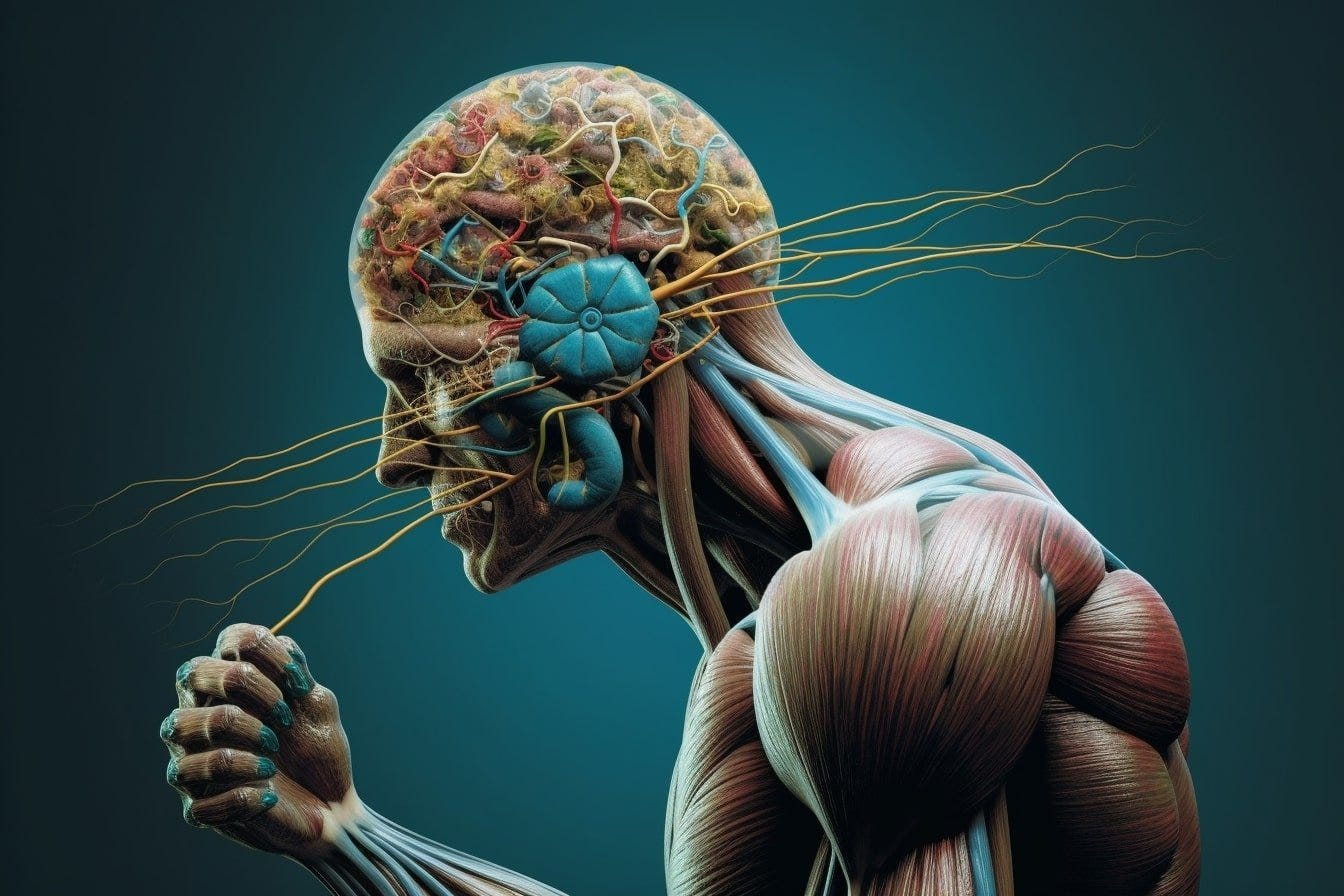The Health Strategist
institute for continuous transformation
in health strategy and digital health
Joaquim Cardoso MSc
Chief Research and Strategy Officer (CRSO)
May 14, 2023
ONE PAGE SUMMARY
Key messages
- The neuroscience of fitness demonstrates the profound and wide-ranging effects of regular exercise on the brain and nervous system.
- The findings highlight the importance of incorporating physical activity into our lifestyles for enhanced brain health, cognitive function, and overall well-being.
One Page Summary
The neuroscience of fitness explores the impact of regular exercise on the brain and nervous system.
- Regular physical activity stimulates neurogenesis in the hippocampus, enhancing memory and learning.
- Exercise improves brain plasticity, aiding in recovery from injury and counteracting cognitive decline.
- Aerobic exercise like running increases hippocampal size, improving spatial memory and cognitive function.
- Physical activity enhances sleep quality, supporting memory consolidation and toxin removal in the brain.
- Exercise helps manage stress by increasing norepinephrine and endorphin levels, promoting happiness.
- Regular physical activity reduces inflammation, benefiting brain health and reducing the risk of neurological conditions.
The release of brain-derived neurotrophic factor (BDNF) nurtures existing neurons and encourages the growth of new neurons and synapses.
- Exercise increases neurotransmitter levels, such as serotonin, dopamine, and norepinephrine, impacting mood regulation and mental alertness.
- Regular physical activity improves cognitive functions, including attention, memory, and executive function.
- Physical exercise promotes brain plasticity, enabling the formation of new neural connections throughout life.
The current evidence strongly supports the remarkable benefits of regular exercise for brain health and cognitive function.
- Integrating exercise into daily routines is essential for maximizing physical and mental health benefits.
In summary, the benefits of physical activity include:
- Improved Brain Health: Regular exercise stimulates neurogenesis, enhances brain plasticity, and increases brain volume, leading to improved memory, learning, and cognitive function.
- Enhanced Mood and Stress Management: Exercise increases the levels of mood-regulating neurotransmitters like serotonin, dopamine, and endorphins, reducing symptoms of depression, anxiety, and stress.
- Better Sleep Quality: Physical activity promotes better sleep quality, supporting memory consolidation and toxin removal in the brain.
- Increased Brain Plasticity: Exercise facilitates brain plasticity, allowing for the formation of new neural connections and improving cognitive functions such as attention, memory, and executive function.
- Reduced Risk of Neurological Conditions: Regular physical activity reduces inflammation in the body, potentially lowering the risk of neurological conditions such as Alzheimer’s and Parkinson’s disease.
- Overall Physical Health: Physical activity improves cardiovascular health, strengthens muscles and bones, boosts immune function, and helps maintain a healthy weight.
- Longevity and Aging: Regular exercise counteracts age-related cognitive decline and promotes healthy aging by preserving brain structure and function.
- Stress Relief and Emotional Well-being: Engaging in physical activity provides a natural outlet for stress, promotes relaxation, and enhances overall emotional well-being.
- Social Interaction and Connection: Participating in group exercises or sports activities fosters social interaction, community engagement, and a sense of belonging.
- Increased Energy and Productivity: Regular physical activity improves energy levels, boosts productivity, and enhances overall mental and physical performance.
DEEP DIVE

Exercise and the Brain: The Neuroscience of Fitness Explored
Neuroscience News
May 13, 2023
Summary: The neuroscience of fitness explores how regular exercise profoundly impacts our brain and nervous system.
Exercise stimulates neurogenesis — the creation of new neurons — primarily in the hippocampus, influencing memory and learning while increasing key mood-regulating neurotransmitters. It also enhances brain plasticity, essential for recovery from injury and aging, and improves cognitive functions such as attention and memory.
Despite ongoing research, the current evidence underscores the powerful role of physical activity in promoting brain health and cognitive function, emphasizing the importance of integrating regular exercise into our lifestyles.
Key Facts:
1.Aerobic Exercise and Brain Volume: Regular aerobic exercise like running can increase the size of the hippocampus and preserve vital brain matter, improving spatial memory and cognitive function.
2.Exercise and Sleep Quality: Regular physical activity can enhance sleep quality, which in turn supports memory consolidation and toxin removal in the brain.
3.Exercise and Stress Reduction: Exercise can help manage stress by increasing norepinephrine and endorphin levels, chemicals that moderate the brain’s response to stress and induce feelings of happiness.
Source: Neuroscience News

The neuroscience of fitness, a fascinating intersection of physical activity and brain health, is a rapidly developing area of research.
This field explores the profound effects of regular exercise on our brain and nervous system, revealing significant implications for our overall health and quality of life.
One key discovery is the relationship between exercise and neurogenesis — the creation of new brain cells. This primarily occurs in the hippocampus, an area of the brain fundamental to learning and memory.
Regular physical activity triggers the release of a protein called brain-derived neurotrophic factor (BDNF), which nurtures existing neurons and encourages the growth and development of new neurons and synapses.
Regular physical activity triggers the release of a protein called brain-derived neurotrophic factor (BDNF), which nurtures existing neurons and encourages the growth and development of new neurons and synapses.
Aerobic exercises like running and swimming are particularly beneficial. They not only stimulate neurogenesis but also increase the size of the anterior hippocampus, leading to improved spatial memory.
Moreover, they’ve been linked to the preservation of white and gray matter in the frontal, temporal, and parietal cortexes, areas that typically shrink with age and are vital for cognitive function.
Exercise also leads to an increase in the levels of certain neurotransmitters, including serotonin, dopamine, and norepinephrine. These chemicals play an essential role in mood regulation, mental alertness, and focus, potentially explaining why physical activity is often associated with reduced symptoms of depression and anxiety.
Exercise also leads to an increase in the levels of certain neurotransmitters, including serotonin, dopamine, and norepinephrine.
These chemicals play an essential role in mood regulation, mental alertness, and focus, potentially explaining why physical activity is often associated with reduced symptoms of depression and anxiety.
Regular physical activity also improves sleep quality, a critical factor in brain health. Enhanced sleep quality allows for better memory consolidation and more efficient toxin removal from the brain.
Physical activity promotes brain plasticity, the brain’s ability to adapt and form new neural connections throughout life. This is especially important for recovery from a brain injury and counteracting the cognitive decline associated with aging.
Additionally, exercise can enhance various cognitive functions, including attention, working memory, executive function, and cognitive flexibility. The prefrontal cortex, a brain area responsible for these functions, appears to respond positively to physical exercise, likely due to the increased blood flow, which delivers more oxygen and nutrients to the brain.
Exercise also helps manage and reduce stress, increasing concentrations of norepinephrine and endorphins, chemicals that moderate the brain’s response to stress and induce feelings of happiness.
The benefits of fitness extend beyond the brain. Regular physical activity reduces inflammation in the body, which can positively impact the brain as chronic inflammation is tied to various neurological conditions, such as Alzheimer’s and Parkinson’s disease.

Despite these promising findings, there’s still much to explore in the neuroscience of fitness.
Questions remain about how different forms of exercise (such as aerobic versus resistance training) impact the brain and how factors like age, genetics, and initial fitness level may influence these effects.
However, the current evidence strongly supports that regular physical activity has remarkable benefits for brain health and cognitive function, underscoring the value of integrating regular exercise into our daily lives for physical and mental health benefits.
About this exercise and neuroscience research news
Author: Press Office
Source: Neuroscience News
Contact: Press Office — Neuroscience News
Image: The image is credited to Neuroscience News
Originally published at https://neurosciencenews.com on May 13, 2023.












